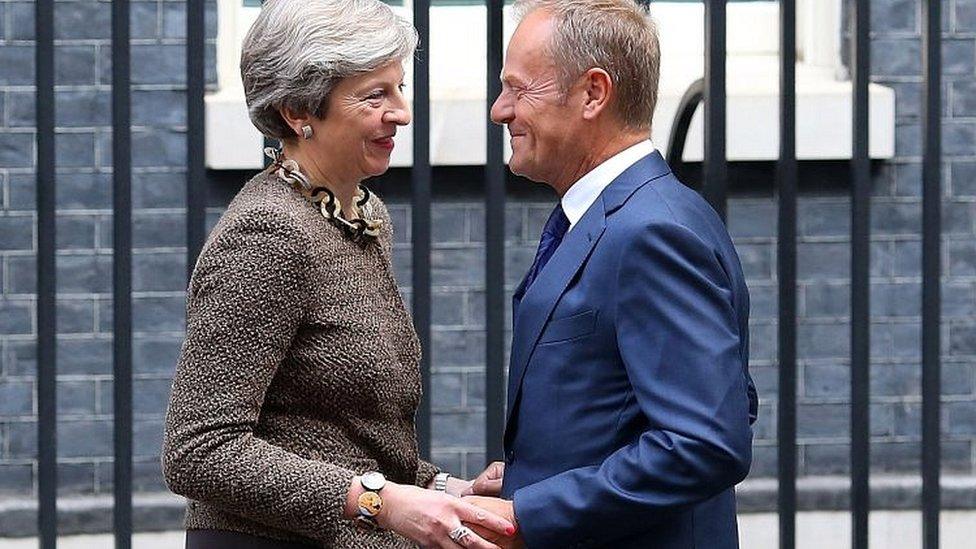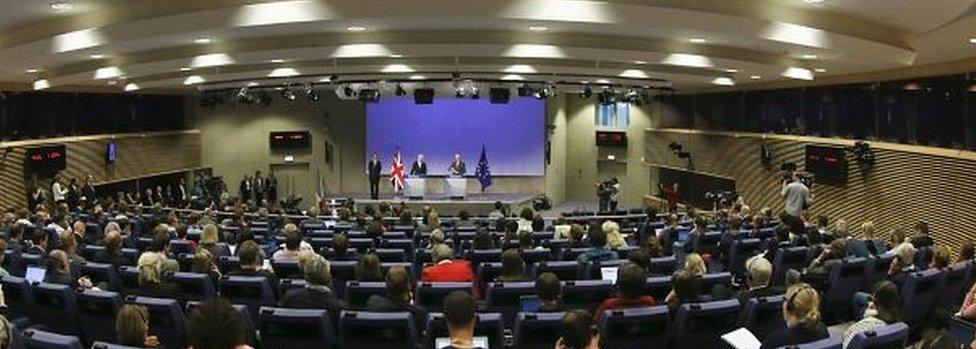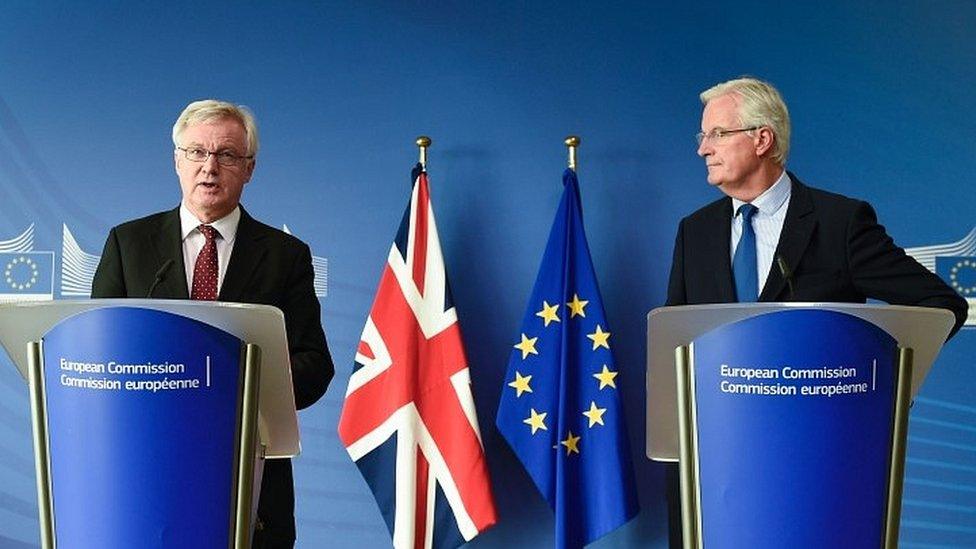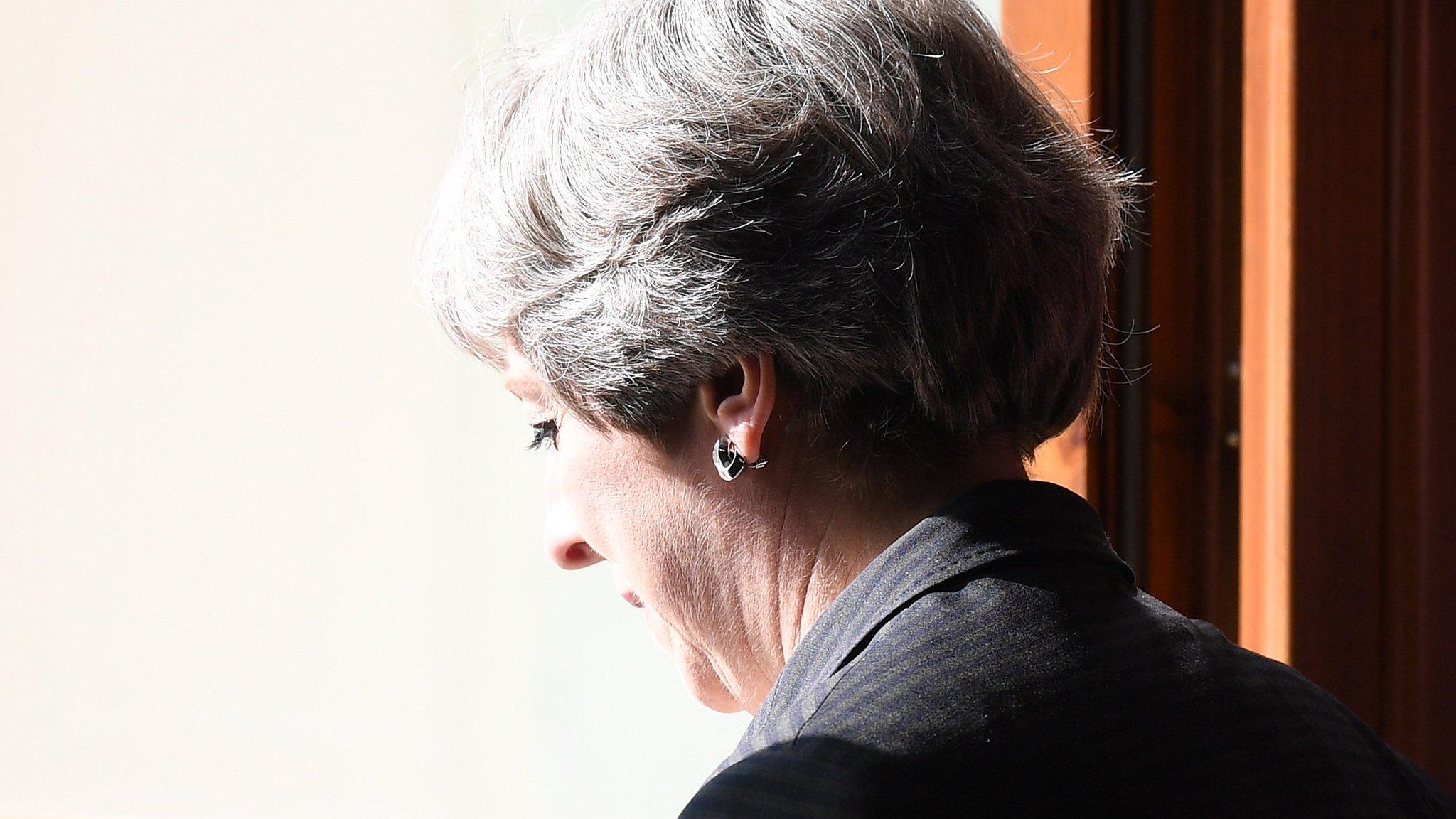David Davis claims 'decisive steps forward' in Brexit talks
- Published
- comments
David Davis and Michel Barnier on the state of talks
"Decisive steps forward" have been made in the latest round of UK-EU talks, Brexit Secretary David Davis has said.
Mr Davis was speaking at the end of the first talks since Theresa May's speech in Italy last week, in which she said the UK wanted a two-year transition.
But EU negotiator Michel Barnier said there were still "big gaps" between the sides on some of the withdrawal issues.
He said it could be "weeks or months" before they agreed to move to the next stage of talks about future relations.
The UK is keen to start talking about what kind of trading relationship it will have with the EU after Brexit, and the original aim had been to get the go-ahead for these discussions when EU leaders meet next month.
But the EU says those talks can only happen when there has been "sufficient progress" on three issues: the so-called divorce bill when the UK leaves, the rights for EU citizens in the UK and UK citizens in the EU and the Northern Ireland border.
In a rare joint statement, trade union group the TUC and the CBI, which represents British businesses, have called for urgent action from the EU and the UK government to guarantee citizens' rights.
They said: "After 15 months of human poker, the uncertainty facing four million European and UK citizens has become intolerable."
Mr Barnier said the UK had confirmed that EU citizens "will be able to invoke their rights before the UK courts" but the sides had failed to agree over the role of the European Court of Justice in securing those rights.
Mrs May insists the UK will not be subject to the European Court of Justice's rulings after Brexit.
Mr Davis echoed her view, saying that the UK will be "a third country outside the European Union [and] it would not be right for this role be performed by the European Court of Justice".

Theresa May discussed Brexit with EC president Donald Tusk earlier this week
He gave an undertaking that the final withdrawal agreement would be incorporated into UK law, but Mr Barnier said the role of the European Court of Justice was "indispensible" and was "a stumbling block" in the talks.
On the other main issues of Northern Ireland and the financial settlement, Mr Davis again said constructive work had been done - but added that the UK was not at the stage of clarifying which financial commitments it accepted would need to be paid.
"We have begun drafting joint principles on preserving the common travel area" between the UK and Republic of Ireland, the Brexit secretary announced, adding: "We are both agreed that the Good Friday Agreement citizenship rights must be upheld."
Mr Barnier said any deal in this area must "respect both the integrity of the single market... and the Good Friday Agreement in all its parts".

Reality Check

By Chris Morris
So in one way Theresa May's speech in Florence has broken the logjam. The mood could have become ugly, and that has changed. There is a "new dynamic".
But some pretty fundamental differences remain - about the role of the European Court of Justice, and about money.
The UK now says it will honour the financial commitments it has made as a member state - but it won't spell out what it thinks those commitments are until it can discuss a future relationship with the EU.
The response to that from Michel Barnier? Well, always pay attention when a politician begins a sentence with the words "being frank…"
"There is no possible link,' he said, "no logical or coherent link", between discussion of a new partnership and discussion of past commitments.
The UK thinks it has shown flexibility, and the EU should do the same. But for now, the EU is sticking with the narrow mandate that Mr Barnier has been given.
In other words, while these negotiations haven't fallen off the rails, this was another reminder of just how difficult and complex they are.

Mr Davis said the prime minister's speech was intended to "change the dynamic and instil real momentum" into the talks - and he hoped EU negotiators would secure "a mandate to explore" the transition idea.
But Mr Barnier insisted that the transition should be discussed in the second phase of negotiations.
"The prime minister's speech in Florence has created a new dynamic in our negotiations and we have felt this during the negotiations this week," the EU's chief negotiator said.
"We have had a constructive week, yes, but we are not yet there in terms of achieving sufficient progress. Further work is needed in the coming weeks and coming months.
"But we will keep working in a constructive spirit until we reach a deal on the essential principles of the UK's orderly withdrawal."
The EU's lead negotiator tells students at the LSE that he doesn't view Brexit as entirely negative
Separately, the European Parliament said that EU leaders should postpone their decision on progress until after their October summit saying "sufficient progress has not yet been made", external in the talks so far.
Guy Verhofstadt, the lead Brexit negotiator for the European Parliament, told an audience at the London School of Economics that he believes a Brexit deal can be done.
"That's the assumption that I have and it is towards that, that we work," he said.
But he said Brexit was "a very negative project" and was "a waste of time and energy".
- Published25 September 2017

- Published22 September 2017
